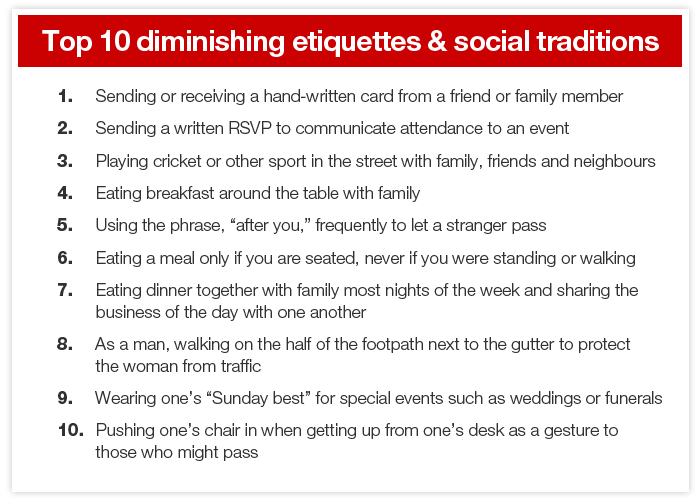Losing It: Aussie Etiquette on the Wane

When talking to Australia’s Builder Generation – those born before WWII, whether it be our parents or grandparents – we are often reminded of social practices and traditions all too common in the 1920s, 30s, and 40s but virtually unheard of today. Similarly, social practices vigorously followed by the Boomers and Gen X are slowly on the wane.
National research recently conducted by McCrindle Research shows that there are a significant number of social practices and traditions regarding etiquette, work, life, and family that are diminishing and slowly disappearing from the Aussie way of life.

Etiquette on the Decline
Pressures in the workplace, relationships and family life have inevitably left us time-poor and frazzled, with etiquette ranking very low on the list of priorities. 9 in 10 Australians (89%) believe that motioning a stranger to pass by using the phrase, “After you,” is a practice that has diminished in Australia. Men walking on the footpath next to the gutter as a gesture to protect women from traffic has also diminished, according to 85% of Australians. Similarly, 8 out of 10 Australians (78%) believe that pushing one’s chair in after getting up from the desk – as a sign to those who might pass – has decreased.
Mannerisms around mealtimes are on the wane. 88% of Australians report that it has become more commonplace to eat meals while standing or walking, rather than sitting. Australians report a decline in table manners such as waiting to eat when the host or hostess gestures and clearing the table after everyone has finished eating. It is also becoming more commonplace to eat while watching television, picking up a smartphone, or browsing the internet.
Qualitative findings indicate the following etiquettes are diminishing in Australian society:
- Holding a door or lift open and opening doors for women
- Saying please and thank you
- Saying hello or acknowledging people
- Giving our full attention to others while they are talking
- Giving up seats for the elderly and those in greater need
- Being respectful to elderly persons
- Not swearing in public
- Men showing respect to women
- Cleaning up after oneself
- Driving courteously and giving way to other drivers
Work Pressures and Diminishing Social Practices
Time pressures around work seem to be increasing in Australia, with social practices surrounding break times and working hours shifting. 75% of Australians believe that the practice of designating at least 30 minutes towards a lunch break is diminishing. Similarly, the practice of assigning several hours on a Friday afternoon to attend an executive lunch is thought to be declining by 68% of Australians.
A number of Australians spoke loudly about the shift taking place in Australian workplaces:
“I’m noticing that there’s less friendship overall in the workplace – everyone is too frantically busy.”
“[There is an] expectation of employers that you will skip lunch and work late without acknowledgement or compensation.”
“It would be great to allow people to have morning and afternoon tea breaks, having an hour lunch break.”
“[I would like a return to] working the hours that you are paid for. There is now a lot of unpaid work for companies that cannot afford to pay their staff.”
Life and Technology
Technology is a primary agent of change when it comes to etiquette. Sitting amongst friends or colleagues without interruptions from our mobile phones is becoming unheard of. The compelling need to text, call others, or browse the web for the latest titbit of news is becoming the norm.
As smartphones become the primary means of communication, we are seeing a decrease in the number of hand-written cards and a replacement of this form of communication by email, SMS, social media, or e-cards. 93% of Australians would agree that receiving or sending a hand-written card is diminishing, and 92% say that the practice of sending a written RSVP to communicate attendance to an event has diminished.
Australians state that sending thank-you cards for gifts has diminished, as well as making direct contact to meet up. One only needs to look at a Facebook event invite to see that RSVPing amongst younger generations seems to be a social norm that is on decline or left until the last minute.
Family and Community Life
Traditions around family and community life are on decline in Australia. 9 in 10 (91%) Australians say that the practice of eating breakfast around the dinner table with family has diminished. Following closely, Australians feel that the practice of eating dinner together with family most nights of the week and sharing in the business of the day with one another is decreasing (87%).
As a nation, we are seeing a decrease in the sanctity of Sunday as a family day, with weekends filling up with sporting commitments and shopping. It is no longer as common for families to participate in events together on weekends – instead, family members seem go their own way. There is also a decrease in time spent with extended family. The practice of travelling with others to outings is decreasing, as more Australians are opting to meet the gathering’s location instead of travelling there together. 91% of Australians report that playing sport in the street with family, friends, and neighbours has diminished, with 51% of Australians saying this has diminished significantly.
For media commentary contact us on 02 8824 3422 or at [email protected]




